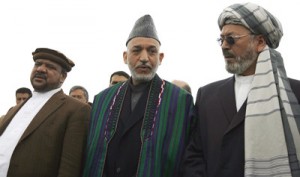Latest News
U.S. watchdog slams Afghan anti-corruption body and former president

 An Afghan anti-corruption body formed in 2008 has been ineffective, lacks independence and never verified the asset declaration forms of former President Hamid Karzai, the U.S. government’s top watchdog on Afghanistan said in a report published on Thursday.
An Afghan anti-corruption body formed in 2008 has been ineffective, lacks independence and never verified the asset declaration forms of former President Hamid Karzai, the U.S. government’s top watchdog on Afghanistan said in a report published on Thursday.
The Special Inspector General for Afghanistan Reconstruction (SIGAR) found that asset declaration forms submitted by Karzai and senior members of his government had omissions and errors.
The report highlights the challenges Afghanistan faces in battling corruption, which U.S. officials say undermines the fight against the Taliban.
Corruption is widely considered pervasive in Afghanistan, which the watchdog group Transparency International ranked 166th out of 168 nations in its annual corruption index this year.
The SIGAR report found that when Karzai submitted his asset declaration form in September 2015, he listed cash in a German bank account but did not give an account number and left the source-of-money field blank.
“Under personal effects, the president listed jewels but again provided no purchase date, no current value, and no source of income to purchase the asset,” the report added.
When then-Vice President Karim Khalili left office, his declaration form said he had “no cash assets or personal effects, and no vehicles, loans, off-duty activities, or educational expenses to declare,” the report said.
Khalili declared a house and four plots of land but gave no information on their value.
The report, citing an adviser with the anti-corruption body, said the asset declaration process was simply “window dressing designed to keep the international community happy.”
Karzai, who has faced criticism for failing to curb corruption during his tenure, could not immediately be reached for comment.
The United States has appropriated nearly $113 billion for reconstruction in Afghanistan since 2001, when U.S.-led forces invaded the country and toppled the Taliban regime.
SIGAR’s website says, “These funds are used to build the Afghan National Security Forces, promote good governance, conduct development assistance, and engage in counter-narcotics and anti-corruption efforts.”
As the U.S.-led International Security Assistance Force (ISAF) has withdrawn troops, however, the Afghan government has been facing a growing threat from a renewed Taliban insurgency.
Published by : Reuters

Latest News
Girls’ education is a ‘vital issue’ for Afghanistan: Karzai

Former president Hamid Karzai said in a meeting with Iran’s ambassador and special representative, Hassan Kazemi Qomi, that education of girls was a “vital issue” for Afghanistan.
Karzai said he appreciated Iran’s cooperation and its standing with the Afghan people, especially Iran’s contributions to education in Afghanistan.
During the meeting, Karzai said peace and stability in the region are in the interest of all regional countries.
Latest News
Uzbekistan’s humanitarian aid arrives in Balkh

A shipment of humanitarian aid from Uzbekistan was handed over on Thursday to the local officials of Balkh province in the trade port of Hairatan.
Local authorities said the aid, which includes flour, oil, wheat, sugar and meat, has been handed over by Uzbekistan’s Surkhandarya governor to the governor of Balkh.
The governor of Surkhandarya stated the purpose of sending this aid was to support the people of Afghanistan and stressed the need for the development of good relations between the two countries.
Latest News
Afghanistan’s problems caused more damage to Pakistan than 3 wars with India: Durrani

Islamabad’s special envoy for Afghanistan Asif Durrani said on Wednesday that Pakistan has suffered more due to Afghanistan’s internal situation than Pakistan has suffered in three wars with India in terms of blood spilt and finances drained.
Durrani said at a one-day International Conference titled “Pakistan in the Emerging Geopolitical Landscape”, which was organized by the Institute of Strategic Studies Islamabad (ISSI) and the German Friedrich Ebert Stiftung (FES), that over 80,000 Pakistanis died in the two decades of the War on Terror and that his country was still counting its dead and injured.
“After the withdrawal of NATO forces, it was hoped that peace in Afghanistan would bring peace to the region. However, such expectations were short-lived,” he said.
He also stated that attacks by the Tehreek-e-Taliban Pakistan (TTP) militant group on Pakistan’s border areas increased by 65 percent, while suicide attacks increased by 500 percent.
“The TTP’s enhanced attacks on Pakistan while using Afghan soil have been a serious concern for Pakistan. Another worrying aspect is the participation of Afghan nationals in these attacks,” he said.
Durrani also said Pakistan had suffered geopolitically since the Soviet Union invaded the neighboring country.
“The post-9/11 world order has negatively impacted Pakistan. Apart from losing 80,000 citizens’ lives, including 8,000 law enforcement agency personnel, the country’s economic opportunity cost is estimated at $150 billion,” Durrani said.
Talking about the future outlook for Pakistan in the regional context, Durrani said that while “our eastern neighbor is likely to continue with its anti-Pakistan pursuits, the western border poses an avoidable irritant in the short to medium term.”
However, he said Pakistan can overcome its difficulties with Afghanistan, including the TTP challenge.
-

 Latest News5 days ago
Latest News5 days agoPakistan’s frontiers minister stresses ‘dignified’ return of Afghan refugees
-

 Regional4 days ago
Regional4 days agoIranian president lands in Pakistan for three-day visit to mend ties
-

 Latest News3 days ago
Latest News3 days agoRashid Khan named AWCC’s brand ambassador
-

 Climate Change5 days ago
Climate Change5 days agoMassive river flooding expected in China, threatening millions
-

 World5 days ago
World5 days agoTwo Japan navy helicopters crash, one body found, 7 missing
-

 Sport4 days ago
Sport4 days agoKolkata beat Bengaluru by one run in IPL as Kohli fumes at dismissal
-

 Sport4 days ago
Sport4 days agoACL: Aino Mina 3-0 Istiqlal Kabul; Attack Energy 3-0 Khadim
-

 Climate Change4 days ago
Climate Change4 days agoRescuers race to reach those trapped by floods in China’s Guangdong














